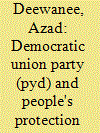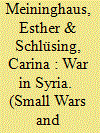| Srl | Item |
| 1 |
ID:
141407


|
|
|
|
|
| Summary/Abstract |
The car bomb sounded like a car backfiring. I heard it, dismissed it, and went back to sleep. It was only a few hours later, as I sat at the window of Erbil’s Hotel Merci, looking out over a two-story image of Leo Messi advertising Pepsi, that I realized how close I had been—too close for comfort—to the city’s first bombing in nearly a year. It had exploded only a few blocks away.
|
|
|
|
|
|
|
|
|
|
|
|
|
|
|
|
| 2 |
ID:
183730


|
|
|
|
|
| Summary/Abstract |
This article explores the construction of the Syrian Kurdish Democratic Union Party (PYD) and the People's Protection Units (YPG) in Turkish official discourse. In the article, I employ critical discourse analysis (CDA) to analyze written texts produced during the years 2014–2019 that reflect the position of the Turkish authorities. The article sets out the main narratives that construct the PYD and YPG as terrorist organizations and posits them as a threat to both Turkey and the international community. The analysis reveals that these narratives serve the purpose of delegitimizing the PYD and YPG and legitimizing Turkish military operations and violations against Syrian Kurds. It highlights that the Turkish official position regarding the PYD and YPG is driven by two ideological factors: first, the influence of Kurdish autonomy in Syria on the action of Kurds in Turkey, and second, the barrier that the PYD and YPG have created against the Islamist agenda of Turkey's Justice and Development Party (AKP) in Syria.
|
|
|
|
|
|
|
|
|
|
|
|
|
|
|
|
| 3 |
ID:
188104


|
|
|
|
|
| Summary/Abstract |
This article is a qualitative study of anti-IS fighters who have traveled from the West to join the military struggle in Syria and Iraq. while earlier studies have mainly analyzed open sources (i.e. social media or journalist’s reports), this article is based on an in-depth analysis of eight autobiographies written by individuals who traveled from Sweden, Norway, Denmark, the United Kingdom, Germany and the U.S. to take part in the fight against IS. What motives do they give for doing so, how are they treated by the police and journalists after they return from the wars in Syria and Iraq, and do they express other motives than those given by Westerners who have joined IS?
|
|
|
|
|
|
|
|
|
|
|
|
|
|
|
|
| 4 |
ID:
173842


|
|
|
|
|
| Summary/Abstract |
Current research on civil war neglects the effect of translocal ties on the mobilization of fighters in armed groups (AGs). Yet the Syrian war demonstrates the necessity to pay close attention to this twofold process: Analysing YPG, Hizballah and FSA networks, we argue that AGs are more likely to persist and avoid fragmentation in the long-term if they maintain strong linkages with local communities (local anchoring) and functioning linkages across different localities. We introduce here the concept of translocality to war studies, differentiating it from transnationalism. This analytical lens enables us to focus on localities within Syria, which can influence an actor’s power position in war decisively, while also being subjected to drastic change by AGs. We conclude that translocality offers insights for the study of civil war as it enables us to grasp the embedding of armed groups – or lack thereof – in local communities; differentiating between actor groups depending on their local anchoring, and observing network dynamics between different localities.
|
|
|
|
|
|
|
|
|
|
|
|
|
|
|
|